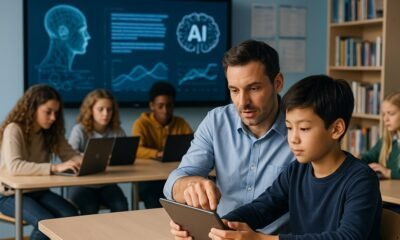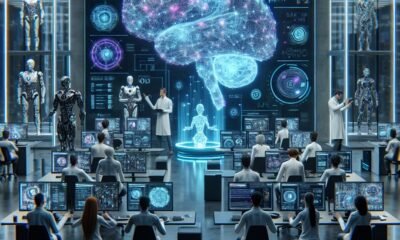Education
Google’s Gemini AI Sparks Debate in Education Settings

Google’s recent rollout of its artificial intelligence tool, Gemini, to schools and students under the age of 19 has sparked a heated debate about the role of AI in education, raising critical questions about its long-term impact on learning and development.
Announced in late June 2025, this initiative expands access to Gemini through Google Workspace for Education, previously restricted to users over 18, and aims to integrate AI as a supportive tool for both students and educators. However, as the technology permeates classrooms worldwide, concerns are mounting over whether it will enhance or undermine foundational skills.
According to TechRadar, Gemini is positioned as an AI assistant capable of aiding teachers with lesson planning and creating engaging presentations, while offering students a resource for research and problem-solving. Yet, the same report highlights a growing unease among educators and policymakers about the implications of such tools becoming ubiquitous in educational settings, potentially altering how students think and learn.
Balancing Innovation and Risk
Critics argue that over-reliance on AI tools like Gemini could erode critical thinking and problem-solving skills, as students might lean on the technology for answers rather than developing their own analytical abilities. There’s also the issue of equity—schools in underfunded districts may struggle to implement or monitor the use of such tools, potentially widening educational disparities.
On the other hand, Google has emphasized safety measures to address some of these concerns. As noted by TechRadar, the company has introduced AI literacy tools, fact-checking features, and stricter content moderation to ensure that younger users are protected from inappropriate material or misinformation. These safeguards are intended to foster responsible use, but skepticism remains about their effectiveness in real-world classroom dynamics.
Ethical and Pedagogical Challenges
Beyond technical safeguards, the ethical implications of AI in education are profound. Will students learn to question the outputs of tools like Gemini, or will they accept AI-generated content as infallible? Educators worry that the technology could inadvertently encourage plagiarism or diminish originality, challenges that are already difficult to manage in the digital age.
Moreover, there’s a broader concern about data privacy. With students under 19 now using Gemini, questions arise about how their data is being collected, stored, and used by Google. While the company has pledged robust data protection measures, as reported by TechRadar, past controversies over tech giants’ handling of personal information fuel ongoing distrust among parents and school administrators.
A Future Under Scrutiny
As Gemini rolls out globally, its integration into education systems will likely serve as a litmus test for how AI can coexist with traditional learning models. Proponents see it as a revolutionary step toward personalized education, where AI tailors content to individual student needs. Detractors, however, caution that without stringent oversight, it risks becoming a crutch rather than a tool.
The debate is far from settled, and the coming years will reveal whether Google’s gamble pays off or if it reshapes education in unintended ways. For now, the eyes of the world are on classrooms, watching as technology and pedagogy collide in a high-stakes experiment.
Education
Microsoft’s Bold Commitment to AI Education at the White House

In a significant move underscoring its dedication to artificial intelligence education, Microsoft Corporation revealed a series of new commitments at the White House’s AI Education Task Force meeting.
During the event, Microsoft Chairman and CEO Satya Nadella emphasized the company’s intent to support the Presidential AI Challenge, reflecting Microsoft’s proactive stance in advancing AI educational initiatives.
The announcements at the White House meeting today further amplify Microsoft’s strategic role in shaping the future of AI learning and its integration into the educational sphere.
Education
NVIDIA Partners With Black Tech Street To Advance AI Education In Tulsa

Black Tech Street (BTS) is bringing transformative AI innovation education to Tulsa’s Historic Greenwood District with the help of microchip maker NVIDIA. The partnership aims to help Tulsa become a national model for tech-driven economic empowerment and community advancement.
NVIDIA, the world’s most valuable company, will collaborate with the organization to lead efforts in integrating cutting-edge technologies, according to The Black Wall Street Times.
“NVIDIA is powering the AI revolution—likely the most impactful leap in human history,” Tyrance Billingsley II, founder and CEO of Black Tech Street, said. “To have them standing with us in Greenwood, committing to help our community harness and lead this revolution, means more than I can articulate. This is a game-changing win for Black Wall Street.”
Advancing tech in Tulsa
As a member of Tulsa’s Tech Hub coalition (led by Tulsa Innovation Labs), Black Tech Street has played a significant role in the city’s designation as a Tech Hub for Autonomous Systems by the US Economic Development Administration.
The coalition recently secured $51 million in federal funding, with $10.6 million allocated to create a Greenwood AI Center of Excellence, led by Black Tech Street. Black Tech Street and NVIDIA will partner with the Tech Hub and local community organizations through this collaboration.
The State of Oklahoma will also be a part of this partnership, as it will train up to 10,000 learners. Training will be delivered through educational institutions and community partners.
Goals of the partnership
The partnership has three main goals: expanding AI education, boosting Tulsa’s economy, and positioning the city as a national hub for AI innovation. By offering advanced training programs through local institutions, the initiative will give Tulsa’s wider community access to in-demand AI skills. In turn, this will help create high-paying jobs and establish Tulsa—through Greenwood—as both a model and a testing ground for AI development.
NVIDIA will commit to the partnership by hiring local entrepreneurs, technologists, and students for NVIDIA’s training and certification programs. The company will also collaborate with Black Tech Street to secure federal, state, and philanthropic funding for research and talent development. Additionally, NVIDIA will connect Tulsa startups with its Inception program and global startup ecosystem to help accelerate local growth.
“This partnership will generate economic impact for years to come. NVIDIA and Black Tech Street are setting the stage for new jobs for Tulsans and opening doors of opportunity for our community,” Tulsa Mayor Monroe Nichols said.
Image: Mike Creef
Education
Education 5.0: AI and personalized learning drive the future of learning

The rapid rise of artificial intelligence (AI) and immersive digital tools is reshaping the foundations of modern education, demanding urgent strategic reform to prepare Generation Alpha for a technology-driven future.
Researchers have mapped this educational shift in a study titled “Education Strategy for the Net Generation”, published in Information. The paper calls for a complete overhaul of conventional teaching practices, outlining a new pedagogical model to align learning with the dynamic realities of the digital and generative AI eras.
The shift from digital to generative pedagogy
The research positions the evolution of education within a broad historical and technological framework, explaining how learning models must keep pace with societal and digital transformations. The authors describe how the transition from Web 2.0 to Web 4.0, combined with the rise of generative AI (GAI), large language models (LLMs), and immersive technologies like AR, VR, and IoT, has ushered education into a new era – Education 5.0.
Education 4.0, driven largely by digital pedagogy and the integration of online platforms, was sufficient for the early 21st century but no longer meets the needs of learners shaped by hyper-connectivity and intelligent systems. Generation Alpha, those born between 2010 and 2024, are fundamentally different from previous generations, acquiring information in complex, dynamic ways and demanding new teaching approaches that merge human intelligence with advanced technological tools. According to the authors, Education 5.0 is not just an incremental improvement; it represents a paradigm shift toward generative pedagogy, a hybrid system combining symbolic cognitive methods with AI-powered connectionist approaches.
This new framework emphasizes personalized learning paths, real-time feedback loops, and collaborative, interdisciplinary environments. Teachers, once positioned as transmitters of knowledge, must now act as mentors and interpreters, guiding students through the complexities of human–machine interaction. The model calls for cultivating not only cognitive skills but also emotional and ethical intelligence, ensuring that students remain critically aware and human-centered in a digital landscape increasingly mediated by AI.
Personalization, feedback, and collaboration in Education 5.0
Generative pedagogy harnesses the power of AI, machine learning, and big data to enhance the learning process. Adaptive platforms analyze student performance and behavior to create individualized learning experiences, ensuring that content delivery aligns with personal learning styles and needs. This hyper-personalization marks a significant departure from the one-size-fits-all approach that defined traditional education.
Real-time feedback has also emerged as a defining characteristic of Education 5.0. AI-powered systems, such as chatbots and smart tutors, are capable of instantly assessing student progress, providing immediate insights, and adjusting learning pathways in response to performance metrics. By integrating sensor technologies like eye-tracking and facial recognition, these systems can measure engagement and attention, offering educators actionable data to refine teaching methods and optimize outcomes.
Collaboration, a cornerstone of contemporary pedagogy, is also being transformed. The research highlights how digital platforms now enable interactive and collaborative learning spaces that transcend geographical barriers. These systems facilitate group discussions, joint projects, and peer-to-peer learning, fostering an environment where knowledge creation becomes a shared, participatory process. The integration of immersive technologies, such as extended reality and virtual environments, further supports active learning and deep engagement, ensuring students are not passive recipients of information but active co-creators of knowledge.
A case study within the research demonstrates how these concepts can be practically applied. In a vocational robotics program, students engaged in immersive digital classrooms that combined traditional teaching methods with VR-enhanced learning modules. The results were compelling: the experimental group outperformed the control group in task completion, demonstrated higher levels of motivation, and achieved better retention of complex concepts. This evidence reinforces the potential of generative pedagogy to enhance both technical proficiency and critical thinking in real-world educational settings.
Challenges, implications, and the road ahead
The study acknowledges significant resistance within educational institutions. Many educators remain skeptical, echoing earlier skepticism during the advent of digital tools, while others express concern over the reliability and ethical implications of AI systems. The rapid pace of technological evolution has also created a gap between industry capabilities and classroom realities, with schools often lagging behind in adopting and integrating cutting-edge innovations.
The authors argue that this resistance underscores the need for a balanced, critically informed approach to integrating AI into education. Generative AI, while powerful, is not infallible. It can produce errors, perpetuate biases, and generate misleading outputs, making critical engagement an essential component of modern learning. Students must be taught to treat AI as a partner rather than an unquestioned authority, applying rigorous sensemaking and analytical skills to every interaction.
The paper calls for redefining teachers’ roles in a hybrid human–machine learning environment. They will no longer be the sole arbiters of knowledge but will function as co-navigators, helping students critically navigate AI-mediated information ecosystems. This shift requires educators to adopt reflective practices and maintain a commitment to pedagogical integrity, ensuring that technology enhances rather than diminishes the human essence of education.
-

 Business6 days ago
Business6 days agoThe Guardian view on Trump and the Fed: independence is no substitute for accountability | Editorial
-
Tools & Platforms3 weeks ago
Building Trust in Military AI Starts with Opening the Black Box – War on the Rocks
-

 Ethics & Policy1 month ago
Ethics & Policy1 month agoSDAIA Supports Saudi Arabia’s Leadership in Shaping Global AI Ethics, Policy, and Research – وكالة الأنباء السعودية
-

 Events & Conferences4 months ago
Events & Conferences4 months agoJourney to 1000 models: Scaling Instagram’s recommendation system
-

 Jobs & Careers2 months ago
Jobs & Careers2 months agoMumbai-based Perplexity Alternative Has 60k+ Users Without Funding
-

 Education2 months ago
Education2 months agoVEX Robotics launches AI-powered classroom robotics system
-

 Funding & Business2 months ago
Funding & Business2 months agoKayak and Expedia race to build AI travel agents that turn social posts into itineraries
-

 Podcasts & Talks2 months ago
Podcasts & Talks2 months agoHappy 4th of July! 🎆 Made with Veo 3 in Gemini
-

 Podcasts & Talks2 months ago
Podcasts & Talks2 months agoOpenAI 🤝 @teamganassi
-

 Education2 months ago
Education2 months agoMacron says UK and France have duty to tackle illegal migration ‘with humanity, solidarity and firmness’ – UK politics live | Politics



















